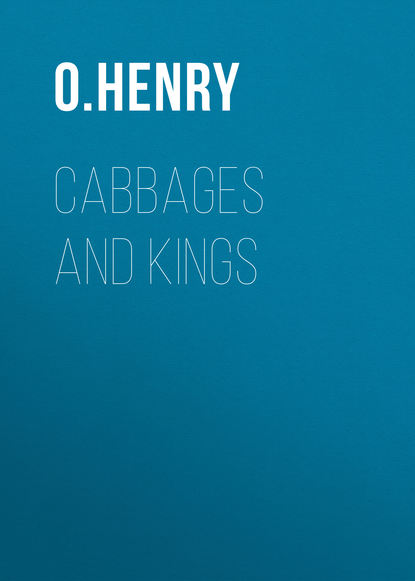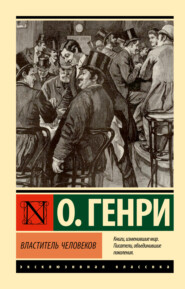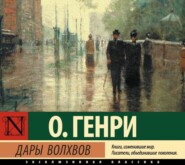По всем вопросам обращайтесь на: info@litportal.ru
(©) 2003-2025.
✖
Cabbages and Kings
Настройки чтения
Размер шрифта
Высота строк
Поля
"'Twas a pleasant sound when the steamer bumped against the pier in New Orleans. Pretty soon we heard the pat-a-pat of hundreds of bare feet, and the Dago gang that unloads the fruit jumped on the deck and down into the hold. Me and the general worked a while at passin' up the bunches, and they thought we were part of the gang. After about an hour we managed to slip off the steamer onto the wharf.
"'Twas a great honour on the hands of an obscure Clancy, havin' the entertainment of the representative of a great foreign filibusterin' power. I first bought for the general and myself many long drinks and things to eat that were not bananas. The general man trotted along at my side, leavin' all the arrangements to me. I led him up to Lafayette Square and set him on a bench in the little park. Cigarettes I had bought for him, and he humped himself down on the seat like a little, fat, contented hobo. I look him over as he sets there, and what I see pleases me. Brown by nature and instinct, he is now brindled with dirt and dust. Praise to the mule, his clothes is mostly strings and flaps. Yes, the looks of the general man is agreeable to Clancy.
"I ask him, delicate, if, by any chance, he brought away anybody's money with him from Guatemala. He sighs and bumps his shoulders against the bench. Not a cent. All right. Maybe, he tells me, some of his friends in the tropic outfit will send him funds later. The general was as clear a case of no visible means as I ever saw.
"I told him not to move from the bench, and then I went up to the corner of Poydras and Carondelet. Along there is O'Hara's beat. In five minutes along comes O'Hara, a big, fine man, red-faced, with shinin' buttons, swingin' his club. 'Twould be a fine thing for Guatemala to move into O'Hara's precinct. 'Twould be a fine bit of recreation for Danny to suppress revolutions and uprisin's once or twice a week with his club.
"'Is 5046 workin' yet, Danny?' says I, walkin' up to him.
"'Overtime,' says O'Hara, lookin' over me suspicious. 'Want some of it?'
"Fifty-forty-six is the celebrated city ordinance authorizin' arrest, conviction and imprisonment of persons that succeed in concealin' their crimes from the police.
"'Don't ye know Jimmy Clancy?' says I. 'Ye pink-gilled monster.' So, when O'Hara recognized me beneath the scandalous exterior bestowed upon me by the tropics, I backed him into a doorway and told him what I wanted, and why I wanted it. 'All right, Jimmy,' says O'Hara. 'Go back and hold the bench. I'll be along in ten minutes.'
"In that time O'Hara strolled through Lafayette Square and spied two Weary Willies disgracin' one of the benches. In ten minutes more J. Clancy and General De Vega, late candidate for the presidency of Guatemala, was in the station house. The general is badly frightened, and calls upon me to proclaim his distinguishments and rank.
"'The man,' says I to the police, 'used to be a railroad man. He's on the bum now. 'Tis a little bughouse he is, on account of losin' his job.'
"'Carrambos!' says the general, fizzin' like a little soda-water fountain, 'you fought, señor, with my forces in my native country. Why do you say the lies? You shall say I am the General De Vega, one soldier, one caballero– '
"'Railroader,' says I again. 'On the hog. No good. Been livin' for three days on stolen bananas. Look at him. Ain't that enough?'
"Twenty-five dollars or sixty days, was what the recorder gave the general. He didn't have a cent, so he took the time. They let me go, as I knew they would, for I had money to show, and O'Hara spoke for me. Yes; sixty days he got. 'Twas just so long that I slung a pick for the great country of Kam – Guatemala."
Clancy paused. The bright starlight showed a reminiscent look of happy content on his seasoned features. Keogh leaned in his chair and gave his partner a slap on his thinly-clad back that sounded like the crack of the surf on the sands.
"Tell 'em, ye divil," he chuckled, "how you got even with the tropical general in the way of agricultural manœuvrings."
"Havin' no money," concluded Clancy, with unction, "they set him to work his fine out with a gang from the parish prison clearing Ursulines Street. Around the corner was a saloon decorated genially with electric fans and cool merchandise. I made that me headquarters, and every fifteen minutes I'd walk around and take a look at the little man filibusterin' with a rake and shovel. 'Twas just such a hot broth of a day as this has been. And I'd call at him 'Hey, monseer!' and he'd look at me black, with the damp showin' through his shirt in places.
"'Fat, strong mans,' says I to General De Vega, 'is needed in New Orleans. Yes. To carry on the good work. Carrambos! Erin go bragh!'"
XI
THE REMNANTS OF THE CODE
Breakfast in Coralio was at eleven. Therefore the people did not go to market early. The little wooden market-house stood on a patch of short-trimmed grass, under the vivid green foliage of a bread-fruit tree.
Thither one morning the venders leisurely convened, bringing their wares with them. A porch or platform six feet wide encircled the building, shaded from the mid-morning sun by the projecting, grass-thatched roof. Upon this platform the venders were wont to display their goods – newly-killed beef, fish, crabs, fruit of the country, cassava, eggs, dulces and high, tottering stacks of native tortillas as large around as the sombrero of a Spanish grandee.
But on this morning they whose stations lay on the seaward side of the market-house, instead of spreading their merchandise formed themselves into a softly jabbering and gesticulating group. For there upon their space of the platform was sprawled, asleep, the unbeautiful figure of "Beelzebub" Blythe. He lay upon a ragged strip of cocoa matting, more than ever a fallen angel in appearance. His suit of coarse flax, soiled, bursting at the seams, crumpled into a thousand diversified wrinkles and creases, inclosed him absurdly, like the garb of some effigy that had been stuffed in sport and thrown there after indignity had been wrought upon it. But firmly upon the high bridge of his nose reposed his gold-rimmed glasses, the surviving badge of his ancient glory.
The sun's rays, reflecting quiveringly from the rippling sea upon his face, and the voices of the market-men woke "Beelzebub" Blythe. He sat up, blinking, and leaned his back against the wall of the market. Drawing a blighted silk handkerchief from his pocket, he assiduously rubbed and burnished his glasses. And while doing this he became aware that his bedroom had been invaded, and that polite brown and yellow men were beseeching him to vacate in favour of their market stuff.
If the señor would have the goodness – a thousand pardons for bringing to him molestation – but soon would come the compradores for the day's provisions – surely they had ten thousand regrets at disturbing him!
In this manner they expanded to him the intimation that he must clear out and cease to clog the wheels of trade.
Blythe stepped from the platform with the air of a prince leaving his canopied couch. He never quite lost that air, even at the lowest point of his fall. It is clear that the college of good breeding does not necessarily maintain a chair of morals within its walls.
Blythe shook out his wry clothing, and moved slowly up the Calle Grande through the hot sand. He moved without a destination in his mind. The little town was languidly stirring to its daily life. Golden-skinned babies tumbled over one another in the grass. The sea breeze brought him appetite, but nothing to satisfy it. Throughout Coralio were its morning odors – those from the heavily fragrant tropical flowers and from the bread baking in the outdoor ovens of clay and the pervading smoke of their fires. Where the smoke cleared, the crystal air, with some of the efficacy of faith, seemed to remove the mountains almost to the sea, bringing them so near that one might count the scarred glades on their wooded sides. The light-footed Caribs were swiftly gliding to their tasks at the waterside. Already along the bosky trails from the banana groves files of horses were slowly moving, concealed, except for their nodding heads and plodding legs, by the bunches of green-golden fruit heaped upon their backs. On doorsills sat women combing their long, black hair and calling, one to another, across the narrow thoroughfares. Peace reigned in Coralio – arid and bald peace; but still peace.
On that bright morning when Nature seemed to be offering the lotus on the Dawn's golden platter "Beelzebub" Blythe had reached rock bottom. Further descent seemed impossible. That last night's slumber in a public place had done for him. As long as he had had a roof to cover him there had remained, unbridged, the space that separates a gentleman from the beasts of the jungle and the fowls of the air. But now he was little more than a whimpering oyster led to be devoured on the sands of a Southern sea by the artful walrus, Circumstance, and the implacable carpenter, Fate.
To Blythe money was now but a memory. He had drained his friends of all that their good-fellowship had to offer; then he had squeezed them to the last drop of their generosity; and at the last, Aaron-like, he had smitten the rock of their hardening bosoms for the scattering, ignoble drops of Charity itself.
He had exhausted his credit to the last real. With the minute keenness of the shameless sponger he was aware of every source in Coralio from which a glass of rum, a meal or a piece of silver could be wheedled. Marshalling each such source in his mind, he considered it with all the thoroughness and penetration that hunger and thirst lent him for the task. All his optimism failed to thresh a grain of hope from the chaff of his postulations. He had played out the game. That one night in the open had shaken his nerves. Until then there had been left to him at least a few grounds upon which he could base his unblushing demands upon his neighbours' stores. Now he must beg instead of borrowing. The most brazen sophistry could not dignify by the name of "loan" the coin contemptuously flung to a beachcomber who slept on the bare boards of the public market.
But on this morning no beggar would have more thankfully received a charitable coin, for the demon thirst had him by the throat – the drunkard's matutinal thirst that requires to be slaked at each morning station on the road to Tophet.
Blythe walked slowly up the street, keeping a watchful eye for any miracle that might drop manna upon him in his wilderness. As he passed the popular eating house of Madama Vasquez, Madama's boarders were just sitting down to freshly-baked bread, aguacates, pines and delicious coffee that sent forth odorous guarantee of its quality upon the breeze. Madama was serving; she turned her shy, stolid, melancholy gaze for a moment out the window; she saw Blythe, and her expression turned more shy and embarrassed. "Beelzebub" owed her twenty pesos. He bowed as he had once bowed to less embarrassed dames to whom he owed nothing, and passed on.
Merchants and their clerks were throwing open the solid wooden doors of their shops. Polite but cool were the glances they cast upon Blythe as he lounged tentatively by with the remains of his old jaunty air; for they were his creditors almost without exception.
At the little fountain in the plaza he made an apology for a toilet with his wetted handkerchief. Across the open square filed the dolorous line of friends of the prisoners in the calaboza, bearing the morning meal of the immured. The food in their hands aroused small longing in Blythe. It was drink that his soul craved, or money to buy it.
In the streets he met many with whom he had been friends and equals, and whose patience and liberality he had gradually exhausted. Willard Geddie and Paula cantered past him with the coolest of nods, returning from their daily horseback ride along the old Indian road. Keogh passed him at another corner, whistling cheerfully and bearing a prize of newly-laid eggs for the breakfast of himself and Clancy. The jovial scout of Fortune was one of Blythe's victims who had plunged his hand oftenest into his pocket to aid him. But now it seemed that Keogh, too, had fortified himself against further invasions. His curt greeting and the ominous light in his full, grey eye quickened the steps of "Beelzebub," whom desperation had almost incited to attempt an additional "loan."
Three drinking shops the forlorn one next visited in succession. In all of these his money, his credit and his welcome had long since been spent; but Blythe felt that he would have fawned in the dust at the feet of an enemy that morning for one draught of aguardiente. In two of the pulperias his courageous petition for drink was met with a refusal so polite that it stung worse than abuse. The third establishment had acquired something of American methods; and here he was seized bodily and cast out upon his hands and knees.
This physical indignity caused a singular change in the man. As he picked himself up and walked away, an expression of absolute relief came upon his features. The specious and conciliatory smile that had been graven there was succeeded by a look of calm and sinister resolve. "Beelzebub" had been floundering in the sea of improbity, holding by a slender life-line to the respectable world that had cast him overboard. He must have felt that with this ultimate shock the line had snapped, and have experienced the welcome ease of the drowning swimmer who has ceased to struggle.
Blythe walked to the next corner and stood there while he brushed the sand from his garments and re-polished his glasses.
"I've got to do it – oh, I've got to do it," he told himself, aloud. "If I had a quart of rum I believe I could stave it off yet – for a little while. But there's no more rum for – 'Beelzebub,' as they call me. By the flames of Tartarus! if I'm to sit at the right hand of Satan somebody has got to pay the court expenses. You'll have to pony up, Mr. Frank Goodwin. You're a good fellow; but a gentleman must draw the line at being kicked into the gutter. Blackmail isn't a pretty word, but it's the next station on the road I'm travelling."
With purpose in his steps Blythe now moved rapidly through the town by way of its landward environs. He passed through the squalid quarters of the improvident negroes and on beyond the picturesque shacks of the poorer mestizos. From many points along his course he could see, through the umbrageous glades, the house of Frank Goodwin on its wooded hill. And as he crossed the little bridge over the lagoon he saw the old Indian, Galvez, scrubbing at the wooden slab that bore the name of Miraflores. Beyond the lagoon the lands of Goodwin began to slope gently upward. A grassy road, shaded by a munificent and diverse array of tropical flora wound from the edge of an outlying banana grove to the dwelling. Blythe took this road with long and purposeful strides.
Goodwin was seated on his coolest gallery, dictating letters to his secretary, a sallow and capable native youth. The household adhered to the American plan of breakfast; and that meal had been a thing of the past for the better part of an hour.
The castaway walked to the steps, and flourished a hand.
"Good morning, Blythe," said Goodwin, looking up. "Come in and have a chair. Anything I can do for you?"
"I want to speak to you in private."
Goodwin nodded at his secretary, who strolled out under a mango tree and lit a cigarette. Blythe took the chair that he had left vacant.
"I want some money," he began, doggedly.
"I'm sorry," said Goodwin, with equal directness, "but you can't have any. You're drinking yourself to death, Blythe. Your friends have done all they could to help you to brace up. You won't help yourself. There's no use furnishing you with money to ruin yourself with any longer."
"Dear man," said Blythe, tilting back his chair, "it isn't a question of social economy now. It's past that. I like you, Goodwin; and I've come to stick a knife between your ribs. I was kicked out of Espada's saloon this morning; and Society owes me reparation for my wounded feelings."
"I didn't kick you out."
"No; but in a general way you represent Society; and in a particular way you represent my last chance. I've had to come down to it, old man – I tried to do it a month ago when Losada's man was here turning things over; but I couldn't do it then. Now it's different. I want a thousand dollars, Goodwin; and you'll have to give it to me."

















